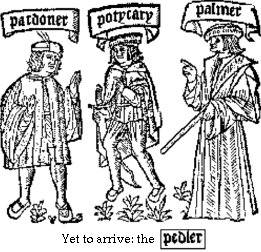A Play of Four "P"s
Another interlude* involves a debate--more a competition in fact-- between four men whose trades begin with the
letter "P."
Two are churchmen--a Pardoner and a Palmer--one is a medieval pharmacist (an aPothecary), and the last is a Pedlar. The first three are arguing which of them should "take the best place," or be considered the most important. The Pedlar suggests a competition to decide: each is to tell an elaborate lie; the best liar shall "most prevail."
Click on the three pictures (and the old spelling "pedler") to learn about their trades and the lies they tell.
Footnotes
-
John Heywood, the author
The Play Called the Four PP was written in the 1520s before the Protestant Reformation in England. The author, John Heywood, wrote several interludes. His daughter was John Donne's mother.
-
The Pardoner
Pardoners were licenced by the Church to sell "indulgences" to those who wished to have their sins forgiven. Their reputations tended to be unsavoury, as Chaucer's well-known "Pardoner's Tale" indicates.
In the Four PP, the Pardoner claims to have travelled to Hell to search for a woman friend who had disappeared. Sure enough, she is there, so the Pardoner asks that she be released. Lucifer is delighted to let her go:
"Now, by our honour," said Lucifer
"No devil in Hell shall withold her!"
Women, it seems, outnumber men in Hell by ten to one.
-
The Apothecary
Apothecaries, like modern pharmacists, dispensed medicine, and advised on illnesses. Apothecaries were not always trusted; often they were criticised for the expense and elaborateness of the remedies they prescribed.
The Pothecary tells of a miraculous cure he performed on a young woman by administering a powerful purgative. His tall tale, like the Pardoner's, is in the tradition of misogynist literature; it is, however, colourful, boastful, and distinctly scatological.
-
The Palmer
Palmers were pilgrims who travelled from sacred shrine to shrine, begging alms as they went and praying for those who helped them. The palm was a badge that indicated a pilgrim who had been to the Holy Land.
In the Four PP, the Palmer claims to be amazed by the tales of the other two, so unkind to women. He has travelled far, but has always found women mild and gentle:
Yet in all the places where I have been.
Of all the women that I have seen.
I never saw, nor knew, in my conscience,
Any one woman out of patience.
This lie is so outrageous that the Pedler awards him the prize in the contest.
-
The Pedlar
Pedlars were door-to-door salesmen, frequenting fairs and festivals, and selling all kinds of trinkets or "fairings." Autolycus, in The Winter's Tale, is representative--as adept at cutting purses as at selling his ballads and ribbons.
The Pedlar concludes the Four PP by preaching tolerance, common sense, and piety. One may suspect that Heywood is more interested in making his play an example of good doctrine at this point, rather than trying to create consistent characterization.
